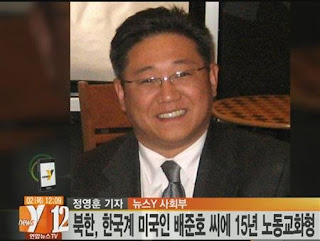NORTH Korea said it won't invite any leading US figure to seek the release of a jailed American and he would not become a "bargaining chip" in any political negotiations.
"Some media of the US said that the DPRK (North Korea) tried to use Pae's case as a political bargaining chip. This is a ridiculous and wrong guess," a foreign ministry spokesman told the official KCNA news agency.
"The DPRK has no plan to invite anyone of the US as regards Pae's issue."
The North said it had sentenced Pae, known in the US as Kenneth Bae, to 15 years' hard labour for "hostile acts" aimed at toppling the communist regime at a trial on April 30.
The Korean-American tour operator was arrested in November as he entered the northeastern port city of Rason.
Several Americans have been held in the North in recent years, and been freed after visits by high-profile Americans such as former presidents Jimmy Carter and Bill Clinton.
In 2010 Carter negotiated the release of US citizen Aijalon Mahli Gomes, who was sentenced to eight years' hard labour for illegally entering the country.
In 2009 Clinton managed to free US television journalists Laura Ling and Euna Lee, also jailed for an illegal border crossing.
The ministry spokesman said Pyongyang had showed "generosity... from the humanitarian point of view" in the past, but the latest case proved that such generosity will "be in no use in ending Americans' illegal acts".
"As long as the US hostile policy goes on, American's illegal acts should be countered with strict legal sanctions. This is a conclusion drawn by the DPRK."
The latest development comes amid high military tension on the peninsula.
Pyongyang, angered by new UN sanctions for its third nuclear test in February and by US-South Korean joint military drills, has issued blistering threats of missile and nuclear attacks targeting the South and the United States.
The United States has called for the immediate release of Bae, whose alleged offence is unclear.
Seoul-based activist Do Hee-Yoon has told AFP he suspected Bae was arrested because he had taken photographs of emaciated children in North Korea as part of efforts to appeal for more outside aid.
The North's spokesman said Sunday that Bae's belongings confirmed the crime for which he was convicted but did not elaborate.
"He entered the DPRK with a disguised identity in an intentional way under the back-stage manipulation of the forces hostile toward the DPRK," the spokesman said, adding he had made a confession.




















